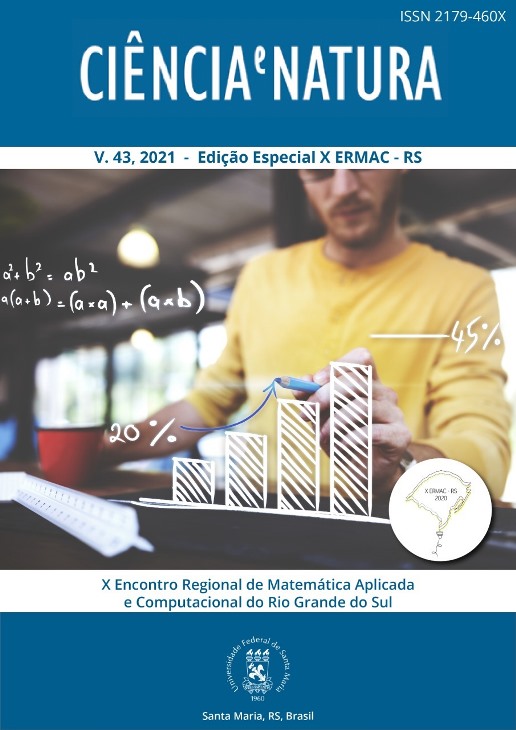Avaliação do potencial térmico de trocadores de calor solo-ar
DOI:
https://doi.org/10.5902/2179460X66949Palavras-chave:
Trocadores de calor solo-ar, Diferenças finitas, Conforto térmico, Eficiência energética.Resumo
A humanidade tem buscado alternativas aos mais diversos sistemas que utiliza no seu dia, visando alcançar uma convivência mais sustentável com o planeta. Entre tais sistemas, destacam-se os aparelhos e sistemas empregados a fim de atender às demandas de conforto térmico de ambientes internos de edificações, como residências, comércios, hospitais. Os trocadores de calor solo-ar (TCSA) constituem uma opção a ser levada em consideração nesse quesito. Neste trabalho, desenvolve-se um modelo numérico baseado no método das Diferenças Finitas para determinar o potencial térmico de um TCSA composto por um só duto. O modelo é validado com os dados apresentados na literatura mais recente da área e empregado para avaliar o desempenho de um TCSA em uma metrópole no sul do Brasil. Os resultados apontam para a eficiência do sistema em Porto Alegre, destacando uma economia energética significativa decorrente de sua utilização.Downloads
Referências
ASCHER, U. M., GREIF, C. (2011). A First Course in Numerical Methods, 1º edn. Society for Industrial and Applied Mathematics.
BISONIYA, T. S. (2015). Design of earth-air heat exchanger system. Geoethermal Energy, 3(18), 1–10.
BRUM, L. M. L. S., R. S. (2019). Improving the performances of earth-air heat exchangers through constructal design. International Journal of Energy Research, 1, 1–12.
BRUM, R. S. (2013). Modelagem de computacional de trocadores de calor solo-ar. Dissertação de Mestrado, Instituto de Matemática, Estatística e Física, Universidade Federal do Rio Grande, Programa Modelagem Computacional, Rio Grande.
ESTRADA, L. M. L. S. R. L. A. O., E. (2018). The impact of latent heat exchanges of the design of earth-air heat exchangers. Applied Thermal Engineering, 129, 306–317.
MINAEI, S. H., A. (2021). A new transient analytical model for heat transfer of earth-to-air heat exchangers. Journal of Building Engineering, 33, 1–11.
Publicado
Como Citar
Edição
Seção
Licença
Copyright (c) 2021 Ciência e Natura

Este trabalho está licenciado sob uma licença Creative Commons Attribution-NonCommercial-ShareAlike 4.0 International License.
Para acessar a DECLARAÇÃO DE ORIGINALIDADE E EXCLUSIVIDADE E CESSÃO DE DIREITOS AUTORAIS clique aqui.
Diretrizes Éticas para Publicação de Revistas
A revista Ciência e Natura está empenhada em garantir a ética na publicação e na qualidade dos artigos.
A conformidade com padrões de comportamento ético é, portanto, esperada de todas as partes envolvidas: Autores, Editores e Revisores.
Em particular,
Autores: Os Autores devem apresentar uma discussão objetiva sobre a importância do trabalho de pesquisa, bem como detalhes e referências suficientes para permitir que outros reproduzam as experiências. Declarações fraudulentas ou intencionalmente incorretas constituem comportamento antiético e são inaceitáveis. Artigos de Revisão também devem ser objetivos, abrangentes e relatos precisos do estado da arte. Os Autores devem assegurar que seu trabalho é uma obra totalmente original, e se o trabalho e / ou palavras de outros têm sido utilizadas, isso tem sido devidamente reconhecido. O plágio em todas as suas formas constitui um comportamento publicitário não ético e é inaceitável. Submeter o mesmo manuscrito a mais de um jornal simultaneamente constitui um comportamento publicitário não ético e é inaceitável. Os Autores não devem submeter artigos que descrevam essencialmente a mesma pesquisa a mais de uma revista. O Autor correspondente deve garantir que haja um consenso total de todos os Co-autores na aprovação da versão final do artigo e sua submissão para publicação.
Editores: Os Editores devem avaliar manuscritos exclusivamente com base no seu mérito acadêmico. Um Editor não deve usar informações não publicadas na própria pesquisa do Editor sem o consentimento expresso por escrito do Autor. Os Editores devem tomar medidas de resposta razoável quando tiverem sido apresentadas queixas éticas relativas a um manuscrito submetido ou publicado.
Revisores: Todos os manuscritos recebidos para revisão devem ser tratados como documentos confidenciais. As informações ou ideias privilegiadas obtidas através da análise por pares devem ser mantidas confidenciais e não utilizadas para vantagens pessoais. As revisões devem ser conduzidas objetivamente e as observações devem ser formuladas claramente com argumentos de apoio, de modo que os Autores possam usá-los para melhorar o artigo. Qualquer Revisor selecionado que se sinta desqualificado para rever a pesquisa relatada em um manuscrito ou sabe que sua rápida revisão será impossível deve notificar o Editor e desculpar-se do processo de revisão. Os Revisores não devem considerar manuscritos nos quais tenham conflitos de interesse resultantes de relacionamentos ou conexões competitivas, colaborativas ou outras conexões com qualquer dos autores, empresas ou instituições conectadas aos documentos.






